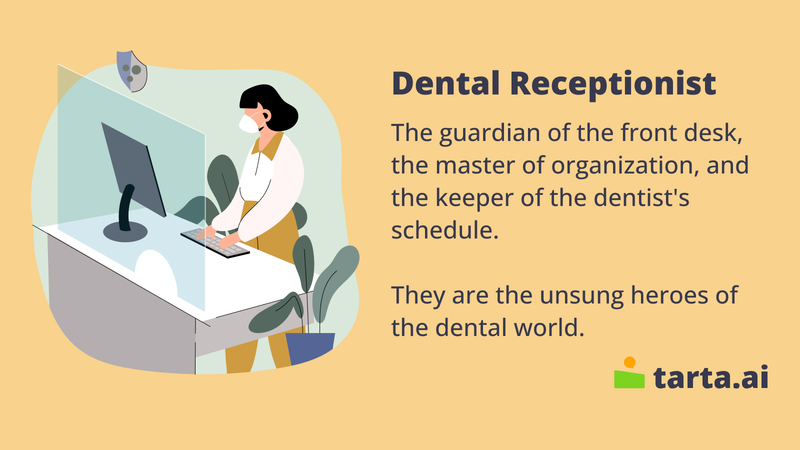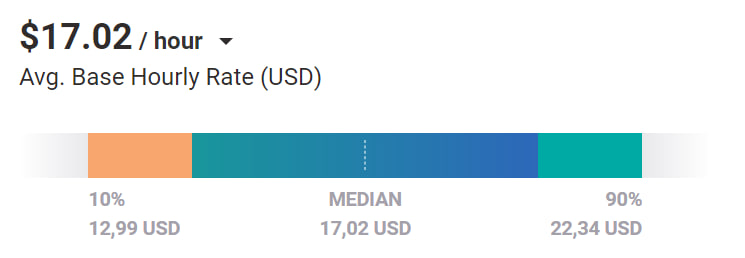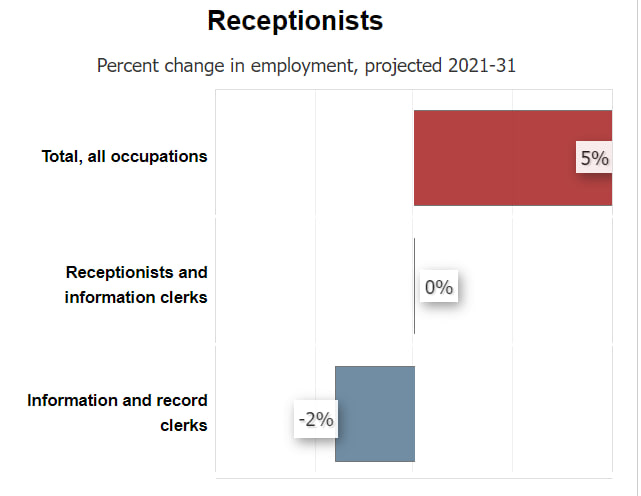Navigating the Career as a Dental Receptionist

This article provides an overview of the role and responsibilities of a dental receptionist, including their key qualifications and the median annual wage they can expect to earn. It also discusses the work environment settings, tools, and technologies used by dental receptionists and the education and training options available for those interested in pursuing a career in this field.
The article explores the different career opportunities and possibilities available for dental receptionists, including entry-level, senior, and managerial positions, as well as specializations and transferable skills. It also covers the job outlook for dental receptionists in the US and the potential for flexible and remote work arrangements. Finally, the article discusses government programs that provide funding for education and training programs in high-demand industries, including healthcare.
Dental Receptionist’s Position Overview
A dental receptionist is a person who works at the front desk of a dental office or clinic, and their main responsibility is to greet and assist patients with scheduling appointments, checking in for their appointments, and managing patient records. In addition, dental receptionists may also answer phone calls, respond to emails, handle billing and insurance-related tasks, and perform other administrative duties as needed. They are typically the first point of contact for patients and play an important role in creating a welcoming and comfortable atmosphere in the dental office.

Key Qualifications for Dental Receptionists
Some key qualifications for a dental receptionist may include:
- Communication skills: Dental receptionists should have excellent verbal and written communication skills to effectively interact with patients, colleagues, and other healthcare professionals. They should be able to communicate clearly and compassionately, while maintaining confidentiality and professionalism.
- Organization and time-management skills: Dental receptionists should be highly organized and able to manage multiple tasks simultaneously. They should be able to prioritize tasks, manage schedules, and maintain accurate patient records.
- Customer service skills: Dental receptionists should be friendly, patient, and approachable. They should be able to greet patients warmly, make them feel comfortable, and provide excellent customer service.
- Computer and technology skills: Dental receptionists should be proficient in using computers and related software, such as electronic health records (EHRs) and appointment scheduling programs.
- Attention to detail: Dental receptionists should be detail-oriented and able to accurately record and maintain patient information, schedule appointments, and process insurance claims.
- Problem-solving skills: Dental receptionists should be able to quickly and effectively resolve problems and address patient concerns, while maintaining a positive attitude and a professional demeanor.
Dental receptionists should be reliable, adaptable, and able to work well under pressure in a fast-paced environment.
Interesting fact:
The majority of dental receptionists work in dental offices (91 percent). The remaining 9 percent work in industries such as physician offices, outpatient care centers, and government.
Tasks and Expectations of Dental Receptionists
The tasks and expectations of a dental receptionist can vary depending on the dental office or clinic they work in, but some common responsibilities include:
- Greeting patients: Dental receptionists are often the first point of contact for patients. They should welcome patients warmly, answer their questions, and ensure they feel comfortable.
- Scheduling appointments: Dental receptionists manage the appointment schedule for the dental office, and they should be able to schedule appointments effectively and efficiently.
- Managing patient records: Dental receptionists should maintain accurate and up-to-date patient records, including medical history, billing information, and insurance records.
- Handling phone calls and emails: Dental receptionists should answer phone calls and emails promptly and professionally, and provide information about the dental office or clinic, as well as schedule appointments and answer patient questions.
- Processing insurance claims: Dental receptionists should be able to process insurance claims accurately and efficiently, including verifying patient coverage and submitting claims to insurance providers.
- Handling payments: Dental receptionists should be able to handle payments from patients, including co-pays, deductibles, and payments for services not covered by insurance.
- Maintaining the office: Dental receptionists should help maintain the cleanliness and organization of the dental office, including managing supplies and equipment.
Dental receptionists play an important role in ensuring that the dental office runs smoothly and that patients receive the care they need in a welcoming and professional environment.
Compensation for Dental Receptionists
The salary of dental receptionists in the US can vary based on factors such as location, experience, and the size of the dental practice. According to data from PayScale, the median hourly wage for dental receptionists is $17.02.

Source: PayScale
It's important to note that this is just a median value, and salaries can range significantly based on factors such as geographic location and years of experience. For example, a dental receptionist in a large city may earn more than one working in a rural area, and a receptionist with several years of experience may earn more than one who is just starting out.
Strategies for Increasing Income for Dental Receptionists
Here are some ways that dental receptionists can potentially increase their income:
Strategy | Description |
Pursue additional education or training | Dental receptionists who expand their skill set by pursuing additional education or training, such as certification in dental assisting or medical billing and coding, may be able to take on additional responsibilities and earn a higher salary. |
Gain experience | As with many careers, experience can lead to higher pay. Dental receptionists who have been in the field for several years and have proven themselves to be skilled and reliable may be able to negotiate a higher salary or be considered for promotions within their dental practice. |
Look for higher-paying jobs | Dental receptionists who are willing to search for jobs at larger practices or in areas with higher cost of living may be able to earn a higher salary. |
Negotiate salary | When starting a new job or at annual reviews, it may be possible for dental receptionists to negotiate a higher salary based on their skills, experience, and the value they bring to the practice. |
Seek out additional part-time work | Some dental receptionists may be able to supplement their income by taking on additional part-time work, such as working at a second dental practice or taking on administrative tasks for a different type of healthcare provider. |
It's important to note that not all of these options will be feasible or desirable for every dental receptionist, and it's important to carefully consider the potential benefits and drawbacks of each before taking action.
Interesting fact:
The states with the highest employment levels of dental receptionists are California, Texas, Florida, New York, and Pennsylvania.
Supplementary Perks for Dental Receptionists
In addition to increasing their income, dental receptionists may also be able to take advantage of additional benefits that can help improve their overall compensation package. Here are some examples:
- Health insurance: Many dental practices offer health insurance benefits to their employees, which can help cover the cost of medical care and reduce out-of-pocket expenses.
- Retirement plans: Some dental practices may offer retirement plans such as 401(k) plans or pension plans to help employees save for their future.
- Paid time off: Dental receptionists may be able to take advantage of paid time off benefits such as vacation days, sick days, and personal days, which can help them balance work and personal responsibilities.
- Continuing education: Some dental practices may offer opportunities for continuing education, which can help dental receptionists expand their skills and knowledge, potentially leading to increased earning potential.
- Employee discounts: Some dental practices may offer discounts on dental services for their employees, which can help reduce the cost of dental care for dental receptionists and their families.
It's important for dental receptionists to carefully review the benefits offered by their employer and consider how they may impact their overall compensation package. Additionally, dental receptionists may be able to negotiate for additional benefits or perks when starting a new job or during annual reviews.
Work Environment for Dental Receptionists
This section will provide an overview of the work environment settings, tools, and technologies used by dental receptionists. As a dental receptionist, it's essential to have a comfortable and organized work environment to perform your job effectively. Understanding the work environment settings and utilizing the right tools and technologies can help dental receptionists streamline their work, enhance their efficiency, and provide high-quality care to patients.

Photo: DCStudio/Freepik
Work Environment Settings
As a dental receptionist, it's important to have a work environment that is comfortable, organized, and conducive to productivity. Here are some work environment settings that may be helpful:
- Reception Desk: You should have a dedicated reception desk that is well-lit, with ample desk space to work on. Ensure that you have access to a comfortable chair and that the desk is at an appropriate height for you to work on.
- Waiting Area: The waiting area should be comfortable, clean, and organized. Patients should be able to sit comfortably while they wait for their appointments, and there should be reading materials and other amenities available.
- Lighting and Temperature: Ensure that the lighting and temperature in the office are comfortable for you and the patients. The office should be well-lit, and the temperature should be set at a comfortable level.
- Safety: The office should be designed with safety in mind. Ensure that you have access to emergency procedures and equipment in case of an emergency, and that the office is equipped with smoke detectors, fire extinguishers, and other safety measures.
By ensuring that you have a comfortable, organized, and safe work environment, you can perform your job effectively as a dental receptionist.
Interesting fact:
The majority of dental receptionists are women, with approximately 94 percent of workers in this occupation identifying as female.
Tools and Technologies Used by Dental Receptionists
As a dental receptionist, you'll need to use various tools and technologies to perform your job effectively. Here are some of the most common ones:
Tools and Technologies | Description |
Practice Management Software | This software is used to manage patient records, appointments, and billing information. It's an essential tool for dental receptionists, as it allows them to access and update patient information quickly and easily. |
Computer and Phone | A computer with high-speed internet and a reliable phone line are essential tools for a dental receptionist. Ensure that your computer is equipped with the necessary software to manage patient records, schedule appointments, and communicate with the dental team. |
Electronic Health Records (EHR) System | This system allows dental receptionists to store, manage and access electronic patient records. This includes patient health history, dental charts, diagnoses, and treatment plans. |
Email and Messaging Systems | Email and messaging systems are used to communicate with patients, dental staff, and other healthcare providers. This includes scheduling appointments, sending reminders, and following up on patient care. |
Office Equipment | As a dental receptionist, you'll need access to various office equipment, such as a computer, printer, scanner, and fax machine. You'll use these tools to manage patient records, print reports, and communicate with others. |
Payment Processing Systems | Payment processing systems allow dental receptionists to process payments from patients, insurance companies, and other payers. This includes using credit card machines, online payment portals, and electronic billing systems. |
Social Media | Social media can be a powerful tool for dental receptionists to communicate with patients, promote the practice, and build relationships with the community. This includes creating and managing social media accounts, posting updates, and responding to comments and messages. |
By using these tools and technologies, dental receptionists can perform their job duties efficiently and effectively, while providing high-quality care to patients.
Education and Training Needed to Become Dental Receptionist
To become a dental receptionist, you typically need a high school diploma or equivalent. However, some employers may prefer candidates who have completed additional education or training in a related field.

Photo: DCStudio/Freepik
Here are some educational and training options that can help prepare you for a career as a dental receptionist:
- Dental receptionist certificate program: Many vocational schools and community colleges offer dental receptionist certificate programs that can provide you with the skills and knowledge needed for the job. These programs typically cover topics such as dental terminology, scheduling appointments, managing patient records, and handling insurance claims.
- On-the-job training: Some dental offices may provide on-the-job training for new receptionists. This can include shadowing experienced receptionists, learning how to use specific dental software, and practicing communication skills with patients and staff.
- Continuing education courses: Even after you've started working as a dental receptionist, you may want to consider taking continuing education courses to keep your skills up-to-date. These courses can cover topics such as HIPAA compliance, customer service, and new dental technologies.
- Customer service training: A large part of a dental receptionist's job involves interacting with patients, so it's important to have strong customer service skills. You may want to consider taking courses or workshops on customer service, communication, and conflict resolution.
- Medical billing and coding courses: While not always required, knowledge of medical billing and coding can be a valuable asset for a dental receptionist. Taking courses in this area can help you better understand insurance claims and reimbursement processes.
A combination of education and on-the-job training can help prepare you for a career as a dental receptionist. It's important to research the specific requirements of the dental offices you're interested in working for to determine what type of education or training they prefer for their receptionists.
Advancement Opportunities for Dental Receptionists
In this section, we explore the various career opportunities and possibilities available for dental receptionists. We begin by discussing the career ladder for dental receptionists and the different levels they can advance to. Next, we look into specializations in dental receptionist jobs that can help individuals enhance their skills and job opportunities. Finally, we explore other career possibilities for dental receptionists.
Overall, this section aims to provide insight into the different career opportunities and possibilities available for dental receptionists and how they can advance their careers and expand their skill set.

Photo: DCStudio/Freepik
Career Ladder for Dental Receptionist
A dental receptionist can advance their career by climbing the following ladder:
- Entry-Level Dental Receptionist: As a beginner, a dental receptionist is responsible for managing the front desk, scheduling appointments, managing patient records, and answering phone calls. They should have strong communication and organizational skills and be able to multitask.
- Senior Dental Receptionist: A senior dental receptionist is responsible for supervising and training new hires, managing the patient flow, coordinating with other departments, and resolving conflicts. They should have excellent customer service and leadership skills.
- Office Manager: An office manager is responsible for overseeing the daily operations of the dental office, managing budgets, supervising staff, and ensuring compliance with regulations. They should have strong managerial, financial, and analytical skills.
- Dental Practice Administrator: A dental practice administrator is responsible for managing multiple dental offices, developing business strategies, implementing policies and procedures, and ensuring the profitability and growth of the practice. They should have a strong business acumen and leadership skills.
To advance in this career, a dental receptionist can also obtain further education and training, such as certifications in dental office management, customer service, and healthcare administration. They can also attend workshops, seminars, and conferences to stay updated on the latest trends and best practices in the industry.
Interesting fact:
The median age of dental receptionists was 39 years old, with approximately 38 percent of workers in this occupation aged 45 or older.
Specializations in Dental Receptionist Job
While there are no formal specializations for dental receptionists, they can develop expertise in specific areas to enhance their skills and job opportunities. Here are a few specializations a dental receptionist can focus on:
Specialization | Description |
Insurance Billing and Coding | Dental receptionists can specialize in handling insurance claims and billing procedures. They should have a thorough understanding of insurance policies, procedures, and codes, and be able to communicate effectively with insurance companies and patients. |
Patient Care Coordination | Some dental receptionists may specialize in coordinating patient care by scheduling appointments, following up with patients, and ensuring they receive timely and appropriate care. They should have excellent customer service skills, be able to communicate well with patients, and be organized. |
Marketing and Sales | Dental receptionists can specialize in marketing and sales by promoting the dental practice to potential patients, developing marketing campaigns, and generating leads. They should have good communication skills, be able to use social media and digital marketing tools, and be knowledgeable about the dental services offered. |
Practice Management | Dental receptionists can specialize in practice management by handling administrative tasks, managing staff, ensuring compliance with regulations, and overseeing financial operations. They should have strong organizational and leadership skills, be able to manage budgets, and be knowledgeable about legal and regulatory issues. |
Dental receptionists can specialize in various areas to enhance their skills and job prospects. By gaining expertise in a particular area, they can advance their career and take on more responsibilities within the dental practice.

Photo: Drazen Zigic/Freepik
Other Career Possibilities for Dental Receptionists
While dental receptionists typically work in dental offices, they may also have transferable skills that could apply to other careers. Here are some other career possibilities for dental receptionists:
- Medical Receptionist: Dental receptionists can easily transition to medical receptionist roles in hospitals, clinics, and medical offices. They can use their skills in scheduling appointments, managing patient records, and communicating effectively with patients.
- Customer Service Representative: Dental receptionists have excellent customer service skills, which can be applied to a variety of industries, such as retail, hospitality, and banking. They can use their communication and organizational skills to handle customer inquiries, manage accounts, and provide exceptional service.
- Administrative Assistant: Dental receptionists have experience in managing administrative tasks, such as data entry, record-keeping, and scheduling appointments. These skills can be applied to administrative assistant roles in various industries.
- Office Manager: With experience in managing administrative tasks and supervising staff, dental receptionists can transition to office manager roles in dental or medical offices, as well as in other industries.
- Healthcare Administrator: Dental receptionists with experience in managing financial operations, overseeing compliance, and developing business strategies can transition to healthcare administrator roles in hospitals, clinics, and other healthcare facilities.
Dental receptionists have transferable skills that can be applied to various careers. By exploring different options, they can find new opportunities to grow their career and expand their skill set.
Dental Receptionist’s Employment Trends
In this section, we will discuss the job outlook for Dental Receptionists in the United States and the potential for flexible and remote work arrangements in this field.
Dental Receptionist Demand
The job outlook for Dental Receptionists in the United States is expecting little to no change. According to the Bureau of Labor Statistics (BLS), employment of receptionists is projected to stay the same from 2021 to 2031.

Source: U.S. Bureau of Labor Statistics, Employment Projections program
On average, over the course of the decade, there are projected to be around 142,300 job openings for receptionists each year, despite limited employment growth. The majority of these openings are anticipated to arise due to the replacement of workers who move to different professions or leave the workforce, such as through retirement.
Flexible Work Arrangements for Dental Receptionists
In terms of flexible work arrangements, dental receptionists may be able to work part-time, job-share with another employee, or work flexible hours outside of the traditional 9-5 schedule. This can be particularly beneficial for those who have other commitments, such as caring for children or elderly relatives.
However, not all dental offices may offer flexible work arrangements. It ultimately depends on the specific office and the preferences of the dentist or practice manager. If you're interested in flexible work arrangements, it's important to communicate your preferences with potential employers during the job search process.
Interesting fact:
The average job satisfaction rating for dental receptionists is 3.8 out of 5. Some of the factors that contribute to job satisfaction in this occupation include a positive work environment, opportunities for career advancement, and the ability to help others.
Dental Receptionist’s Job Fulfillment
In this section, we will be discussing the pros and cons of a dental receptionist’s job. Understanding the advantages and disadvantages of this job can help individuals make informed decisions about their career path.
Pros | Cons |
Interaction with patients As a dental receptionist, you get to interact with patients on a daily basis, which can be fulfilling and rewarding. You get to help people with their dental health and make a difference in their lives. | Repetitive tasks Some of the tasks, such as scheduling appointments, answering phones, and handling paperwork, can be repetitive and mundane. |
Job security There is a constant demand for dental receptionists, which means that job security is high. | High-stress environment The dental industry can be high-stress due to emergencies, last-minute schedule changes, and unhappy patients. |
Flexibility Dental receptionist jobs often offer flexible hours, which can be appealing for individuals with other commitments or responsibilities. | Long hours Dental receptionists may be required to work long hours, including evenings and weekends. |
Entry-level This job can be a good starting point for those who want to get into the dental field but don't have any prior experience. | Limited growth There may be limited opportunities for career advancement beyond the role of receptionist. |
Learning opportunities You will have the opportunity to learn about dental procedures, billing, insurance, and other aspects of the dental industry. | Low pay The pay for dental receptionist jobs may not be as high as other positions in the dental industry. |

Photo: ArtPhoto_studio/Freepik
Government Programs for Dental Receptionists
There are no specific government programs in the United States that provide training or support specifically for dental receptionists. However, there are a variety of government programs that may provide assistance with education and training, which could be helpful for individuals pursuing a career as a dental receptionist.
One example is the Workforce Innovation and Opportunity Act (WIOA), which provides funding for training and education programs that prepare individuals for careers in high-demand industries, including healthcare. Additionally, the Department of Labor's Apprenticeship program provides opportunities for on-the-job training in a variety of fields, including healthcare.
There may also be state-specific programs or initiatives that provide support for individuals pursuing careers in healthcare. It may be worth researching programs and resources available in your state to see if there are any options that could be helpful for your career goals as a dental receptionist.

Photo: Drazen Zigic/Freepik
A career as a dental receptionist can be an excellent choice for individuals who are organized, detail-oriented, and customer-service-focused. Dental receptionists play a critical role in the smooth operation of a dental office or clinic and are often the first point of contact for patients.
This article has provided an overview of the key responsibilities, qualifications, and income expectations of dental receptionists, as well as the different career opportunities available in this field. It has also highlighted the importance of a comfortable and organized work environment and the tools and technologies needed to perform the job effectively.
- Dental receptionists are responsible for managing the front desk of a dental office or clinic, scheduling appointments, managing patient records, processing insurance claims, handling payments, and maintaining the office.
- Key qualifications for a dental receptionist include excellent communication, organization, and customer service skills, proficiency in computer technology, attention to detail, and problem-solving skills.
- Dental receptionists typically earn a median hourly wage of $17.02 in the US, but salaries can vary based on location, experience, and other factors.
- Educational and training options for dental receptionists include dental receptionist certificate programs, on-the-job training, continuing education courses, customer service training, and medical billing and coding courses.
- Career opportunities for dental receptionists include entry-level, senior, and managerial positions, as well as specializations in insurance billing and coding, patient care coordination, marketing and sales, and practice management.
- The job outlook for dental receptionists in the US is projected to stay the same from 2021 to 2031, and flexible work arrangements are becoming increasingly common.
- Transferable skills that dental receptionists possess can be applied to different industries and job roles, including medical reception, customer service, administrative assistance, office management, and healthcare administration.
- Government programs that provide funding for education and training programs in high-demand industries, including healthcare, may be available to support individuals pursuing a career as a dental receptionist.
FAQ
What are the work hours of a dental receptionist?
Dental receptionists typically work full-time hours, which may include evenings and weekends depending on the practice's schedule. Part-time positions may also be available.
How can I prepare for a job as a dental receptionist?
To prepare for a job as a dental receptionist, you may want to gain experience in customer service or office administration. Familiarizing yourself with dental terminology and software programs commonly used in dental practices can also be helpful. Additionally, developing strong communication and organizational skills can make you a competitive candidate for a dental receptionist position.
What software programs are commonly used by dental receptionists?
Commonly used software programs by dental receptionists include electronic health record systems (EHRs) such as Dentrix, Eaglesoft, or Open Dental. These systems help with scheduling appointments, tracking patient information, and managing billing and insurance claims.
What are some common interview questions for a dental receptionist position?
Common interview questions for a dental receptionist position may include:
- Can you describe your experience with customer service?
- What skills or qualities do you possess that would make you an asset to our practice?
- How do you handle difficult patients or situations?
- Can you describe your experience with managing appointments and schedules?
- What experience do you have with insurance and billing processes in a dental setting?
What are some tips for staying organized as a dental receptionist?
To stay organized as a dental receptionist, you can use tools such as a digital calendar, to-do lists, and file management systems. You can also prioritize tasks based on urgency and importance, and break large tasks into smaller, manageable steps. Additionally, regularly decluttering your workspace and keeping it clean can help reduce stress and improve productivity.